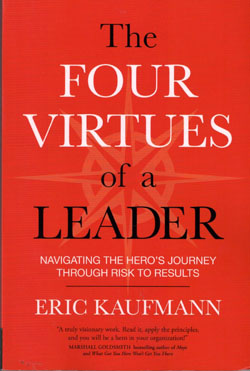The Four Virtues of a Leader by Eric Kaufmann; Sounds True, © 2016; ISBN 9781622-037285; 256 pages, $17.95.
By Donald H. Harrison

 SAN DIEGO – Motivational speaker Eric Kaufman and I attend the same San Diego shul, Tifereth Israel Synagogue, and I thought I would do him a favor by reviewing his book. Turns out, he did me a favor by allowing me to do the review.
SAN DIEGO – Motivational speaker Eric Kaufman and I attend the same San Diego shul, Tifereth Israel Synagogue, and I thought I would do him a favor by reviewing his book. Turns out, he did me a favor by allowing me to do the review.
The four virtues of a leader, in the order they appear in Kaufmann’s book, are focus, courage, grit, and faith. Kaufmann elucidates on each of these virtues, predicting the obstacles we may need to overcome, and the methodologies we might utilize in our “hero’s journey through risk to results.”
In addition to being a guide for business leaders, this book is part autobiography. Kaufmann selects challenges from his own life – trouble at school, early disappointments in business, frustrations as a parent, and lessons gleaned from his Zen practice, among them – to illustrate his points. Someone who desired to write a full-length feature profile on Kaufmann might be tempted to photocopy various pages of the book, cut out those passages Kaufmann writes about himself, then stitch them all together in a chronological narrative. Clearly, the book is not only about business growth, it is also a recipe for personal growth.
Given that he speaks all over the country to Fortune 500 companies, and conducts coaching sessions with their executives, Kaufmann was able to fill his book with numerous examples gleaned on a first-name-only basis from these encounters.
So what does he mean by “focus?” He relates that a goal is a “thing,” something with substance, and that once it is selected, it should become a beacon toward which a leader can steer her/ his decisions. Sometimes reaching the goal may be straightforward, but other times a leader, like a sailor, must continually change the orientation of a boat’s sails to permit forward progress into the wind.
One method for articulating a goal is for the leader to create a personal metaphor to describe her or his role. Kaufmann said he once thought of himself as an “explorer,” but later jettisoned that description in favor of “spelunker.” Why? An explorer often does things on his own, whereas a spelunker needs a team to hold the ropes steady as he or she descends a cliff to the opening of a cave.
Obstacles to focus include “learning confusion” and “defended confusion.” The first is the problem of getting one’s mental arms around a complicated set of instructions. The second, more serious, is the leader creating hurdles as a form of “psychic protection. Explains Kaufmann, “It is a way for the mind to steer us in circles in order to avoid potential danger from uncertainty or failure.”
He had more to say about focus, but let us move on to courage. He explains that courage is purposely engaging with that issue or person which you would rather avoid. Assume you have never liked math, spread sheets terrify you, and you try to run your company by intuition alone. The courageous thing to do would be to sit down and learn how to read and interpret those spread sheets and to better understand how money and opportunity are being used or misused within your company. Or, perhaps as a leader you know that a manager is unfit for the job in which he has been placed. You’ve known for some time he should be fired, but you’ve been putting off the unpleasant confrontation.
Recognizing what you need to do, and then doing it, is a form of courage.
Grit, simply put, is persistence. There are many obstacles on the way to your success. Perhaps your team hasn’t bought into your new idea. Perhaps first quarter results aren’t as hoped for. You may be tempted to abandon the idea in the face of these negative results. But if the idea is a good one, your team, with your assistance, can catch on to your vision. And first-quarter returns may not be indicative of long-range results.
Faith, as described by Kaufmann, is an interesting concept. It means allowing yourself to step out of your comfort zone; to try things in which you have little experience; and to, in essence, surrender that which is familiar, in order to achieve a next-generation goal. Many things will conspire against the faith you put in your idea, fear of failure among them.
Zen practitioner that he is, Kaufmann recommends that a leader try meditation to reach mental clarification, and learn the art of mindfulness to assess how well she or he is interacting with other people as well as with internal stress factors.
Before reading this book, I had decided that I would put San Diego Jewish World on hiatus during the months of January and February 2018 in order to recharge my batteries and to determine in what direction I would like to take this publication in the future. Now, I plan to consult Eric’s book again and again as I go through this process.
Rather than simply allowing myself some rest and relaxation (which everyone needs), I plan to articulate goals both for San Diego Jewish World and for myself, and start putting them into action when publication resumes on March 1, 2018. That’s why I feel Eric did me a great favor.
*
Harrison is editor and publisher of San Diego Jewish World. He may be contacted via donald.harrison@sdjewishworld.com